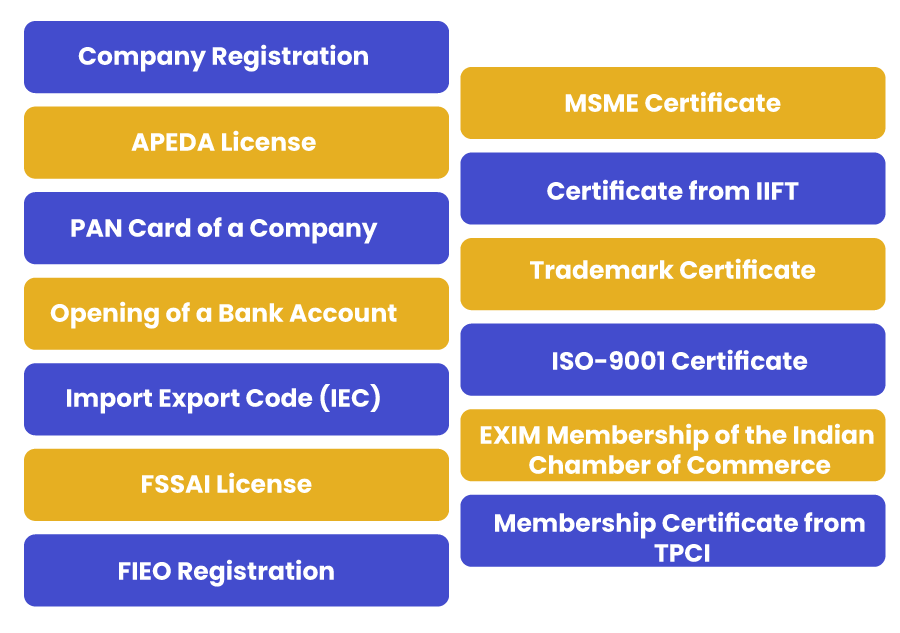What are the Legal Obligations for Dry Fruits Export from India to Abroad?

Karan Singh | Updated: Mar 26, 2021 | Category: IEC, News
Dry fruits are those fruits whose water content has been completely removed either by sun-drying or naturally or through dryers. Dry fruits are also known as the powerhouses of nutrients. In India, there are top ten dry fruits producing states. Export of dry fruits from India comprises the export of almonds, apricot, raisins, cashew, etc. Before commencing any export or import business of any dry fruits, it is compulsory to have an IEC Certificate or Import Export Code. It’s a ten-digit code with lifetime validity, and IEC is issued by the Director General of Foreign Trade (DGFT). But before all this, you must know all the legal obligations for dry fruits export from India to abroad. Scroll down to check more information regarding the legal obligations for dry fruits export from India.
Table of Contents
Export of Dry Fruits from India – An Overview
Before discussing all the legal obligations for Dry Fruits, Export let us fruits know about exporting fruits from India to other countries. The primary states of producers of dry fruits in India are West Bengal, Tamil Nadu, Himachal Pradesh, Jammu & Kashmir, Karnataka, Haryana, and Maharashtra. Dry fruits such as dates, almonds, cashews, raisins are highly in demand in the international market. Before beginning the export business of any dry fruits in India, it is obligatory to obtain an IEC Code issued by the DGFT. This code is basically non-renewal in nature.
India export extreme quality fresh dry fruits to more than 82 countries in the world. Peoples around the world are become health conscious and start including dry fruits in their regular diet because of their health benefits and nutrients. So dry fruits export business in India has observed a noticeable growth. In the Financial Year 2019-2020, The turnover of the dry fruits industry in India was more than thirty crores (INR), and most of the dry fruits were exported from India to various countries such as the UK (United Kingdom), USA (The United States of America), Malaysia, Australia, UAE (United Arab Emirates).
Also, Read: Amendment of IEC Provisions under Foreign Trade Policy by DGFT
List of all Vital Requirements and Registration Intended for Dry Fruits Export from India to Overseas
List of all the essential requirements and registrations are coming under legal obligations for Dry Fruits Export from India to other nations. Following are some government-based registrations that one should obtain before commencing a dry fruits export business in India.

- Company Registration: Don’t make a mistake by avoiding Company Registration and don’t perceive this registration as a problem. It is vital if you ever want to run a successful business house for an extended period. Company Registration not only authorizes your business from the ground but also helps in refining credibility overtime.
- APEDA License: For those who want to involve with the export business of dry fruits in India, it is mandatory to obtain APEDA Registration. But, one has to avail of the IEC Registration in the first place to obtain APEDA License. The applicant looking for APEDA Registration in India has to submit an online application within one month from the date on which the business becomes active. Following is the list of the plan products that come under the APEDA Act, 1985:
- Meat Products;
- Dairy Products;
- Cocoa Products and Cocoa;
- Guar Gum;
- Medicinal and Herbal Plants;
- Poultry Products;
- Cereal Products;
- Peanuts, Groundnuts, and Walnuts;
- Jaggery and Sugar, and Honey Products;
- Floriculture Products;
- Non-Alcohol and Alcohol Beverages;
- All Different Types of Chocolates;
- Pickle, Chutney, and Papad;
- Bakery Products.
- PAN Card of a Company: It is mandatory for taxpaying companies. PAN Card of a Company contains a ten-digit alphanumeric code, and it aids as an identity proof for different purposes. One has to visitthe website of NSDL to file an online application for Company Pan Card.
- Opening of a Bank Account: Details of the bank remain the applicant requirements for registering any business entity in India. The details of the banks contain Branch Name, IFSC Code, and Name of the Account Holder.
- Import Export Code (IEC): This is essential for you to ship your products abroad, and this code is compulsory for export business, and one should avail the same through the website of DGFT.
- FSSAI License: Usually, the FSSAI License is obtained by the Food Business Operators (FBO) in India. Almost every food business established in India have this license, and it also covers those who are involved with the dry fruits export business.
- FIEO Registration: The full form of FIEO is the Federation of Indian Export Organization; it is a top body that was established with a purpose to boost exporters across the nation by executing export-oriented schemes in the view of FTP (Foreign Trade Policy). So, to obtain FIEO Registration in India, one has to go to the official website of FIEO and download the application for the registration. The applicant needs to fill the application and submit all the documents to the office and some essential documents are the IEC Certificate, identity proof, SSI Certificate, and past three years of the balance sheet showing the company’s export.
- MSME Certificate: This is issued to those business houses which are eager to discover the advantages of Government schemes or want to obtain credit with fewer troubles. MSME Certificate would be a plus point for any individual who wants to earn some credibility in both the international and domestic markets. You can go to the official website of Udyog Aadhar Registration to make an online application for the MSME Registration Certificate.
- Certificate from IIFT: IIFT or Indian Institute of Foreign Trade is a well-known government-based educational house that offers various certification courses regarding International Trading. For this certificate, you have to get some academic sessions with the institute for four months. Though it is not compulsory to get this certificate, it just adds some benefits for your business.
- Trademark Certificate: If you want to secure your shipped product labelled with your brand name against any violation of Intellectual Rights, then it is compulsory to obtain a Trademark Registration Certificate.
- ISO-9001 Certificate: This certificate has endured personification for the companies who want to get fineness in the quality of management system. There are some tough criteria for quality management and its main focus on the products and services improvements. With this ISO-9001 Certificate, you will come apart from the competition and earn more credibility over the global market.
- EXIM Membership of the Indian Chamber of Commerce: This membership is granted by the Indian Chamber of Commerce (ICC), and the primary objective of ICC is to work in tandem with its members who are already registered and extends the opportunity of Global Trading to maximize the profit of the exporter. This membership holds an international identification, and it aids the business to take export order from abroad location.
- Membership Certificate from TPCI: Trade Promotion Council is a top trade promotion organization that works under the shade of FTP or Foreign Trade Policy. The main objective of this membership certificate is to form investment and trade opportunities for the business by classifying the new market.
Procedure for Obtaining IEC Certificate for Dry Fruits Export – Legal Obligations for Dry Fruits Export
This is also one of the important legal obligations for Dry Fruits Export, and you can follow the steps as mentioned below to obtain IEC Registration Certificate for exporting dry fruits from India to other countries:
- Visit the website of DGFT.
- After that, you have to click on the option called “Apply for IEC”.
- After clicking this, you will be redirected to a new page where you will see some blank fields.
- Now you have to fill in all the personal information such as Name, Email Id, Mobile Number, and Address.
- After entering the above information, then click on the “Send OTP” button. After this, you will receive a One time Password (OTP) at your entered mobile number and email id.
- After entering OTP, you will be verified and again visit the home and log in by using login details.
- After login, you can now access the application form for IEC Registration.
- Select the right owner category from the options.
- Partner/Karta/Managing Trustee/Director/Proprietor of the Company.
- Then, enter the bank details and upload the soft copy of the cancelled chequebook and then click on the “Save and Next” button.
- Select preferred sectors of operation and acceptance of declaration or undertaking and the click on the “Save and Next” button.
- Finally, click on the “Sign” button at the bottom of the page.
- Then choose the form submitting mode either through DSC (Digital Signature Certificate) or Aadhar OTP. Then you need to finish the payment procedures. The IEC Registration application is covered at Rs. 500/-. You can pay the fees through the portal, and after paying the registration fee, don’t forget to download the receipt.
- You can download the IEC Certificate from the “Print Certificate” located in “Managing IEC” on the website.
Conclusion
As we discussed above are all the legal obligations for Dry Fruits export in India, and also the information has made it clear that the IEC is obligatory for shipment of products into different countries. However, Import Export Code provides many benefits to the exporters involved in Dry Fruit Export from India.
Also, Read: All you need to know about Import Export Code Exemptions in India?














